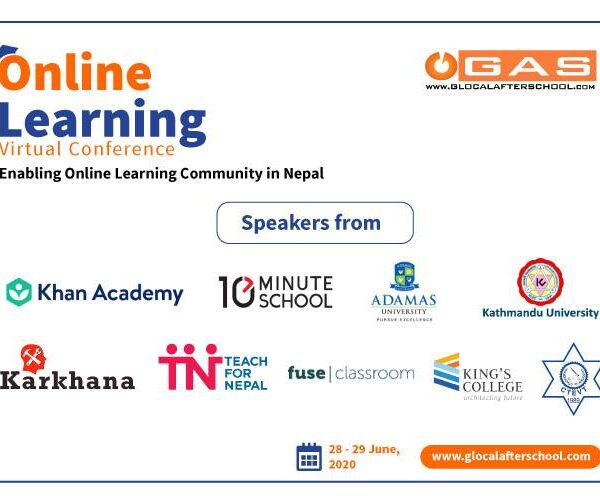The society today is developing at a greater pace and academic learning in schools and colleges are not enough. The market demands something more, something to be developed and packaged to meet the demands of market. It is important to be competitive in every field whether it’s in job, entrepreneurship, politics, or in any field competitiveness in you important. For which skill development, capacity building and knowing the new is important. With the concept to develop what the market demands and creating exceptional and well skilled human resource we are here as Glocal After School (GAS), Fuel your skills and knowledge. GAS e-Learning is a cloud-based e-Learning focusing live learning platform that intends to develop skills of youths and which might not be accessible in schools/colleges.

Introducing Glocal After School:
Introducing The Online Learning Conference
The Online Learning Conference is where we gather industry leaders and doers to look at what’s now, what’s new, and what’s next in learning and development. The Online Learning Conference aim is to build a platform for researchers, industry experts to share their novel ideas, experiences, impacts and results on the application of Online Learning practice. Through this conference, we would like to develop an interdisciplinary venue to contribute and discuss the ongoing innovations, applications and solutions to challenging problems of learning mechanisms. This conference aims to address the main prospects, the challenges and the change in concern within Online Learning. This conference shall covers both technical as well as the non-technical aspects of Online Learning. We have pioneer speakers who can share gripping stories on Online Learning, technology, and the future of learning that will propel the system of learning with inspiration and purpose.
Areas of Discussion
The Online Learning Conference shall be shaped into these three concepts
Embracing the Online Learning Ecosystem
The Online Learning ecosystem consists of learning and teaching community, where the plays the role of three components as building blocks of the ecosystem. The discussion is framed to provide a rich insights into the dynamics of various critical success factors embedded in an Online Learning ecosystems.
The Ins, The Outs and The Affordance to Online Learning
The Online Learning ecosystem has already undergone a visible transformation in recent years, but the platforms have not fully embraced in Nepal. With evolving technologies and shifting priorities, the traditional approach to Learning is hard to compete the modern learners’ needs. Effective learning techniques must be thought of and implemented. This discussion therefore seek to analyze more on the ins, outs and affordability to Online Learning in today’s world.
Maximizing Accessibility for Online Learning
The potential contributing factors and the actual factors in reality, that will help to ascertain the policy measures required for an effective Online Learning. The panel shall highlight on the need for more concreted policy measures to eliminate the identified barriers and adopt an effective Online Learning practice.
Objective of the Conference
Understand the global practices and its impact in the new age of online learning, as through Glocal After School, we seek to build an effective online learning through better interaction and engagement between the learner and teacher communities. Mutual learning & Collaboration with industry leaders, government to design, transform and implement a better online experiences for skilling and online education.
Event Program
Day 1
June 28, 2020 | 16:00 to 17:30
Event Program
Opening Remarks
16:00 – 16:15
Today, Nepal’s education and training sector shows that, for the most part, teaching and training processes remain largely driven by traditional approaches. Even where innovative approaches such as continuing education, distance education and open learning exist, institutions are yet to fully integrate online learning to maximize its cost and efficiency benefits. In conversation with Hon. Giriraj Mani Pokhrel, here we talk about the considerable efforts that can be done by both private and government sector in development for online-learning.
Hon. Giriraj Mani Pokhrel
Minister, Education, Science & Technology, Nepal
Mr. Asish Thakur
ED, Glocal Pvt. Ltd.
Moderator

Discussion 1
Embracing the Online Learning Ecosystem
The Online Learning ecosystem consists of a learning and teaching community, where it plays the role of three components as building blocks of the ecosystem. The discussion is framed to provide rich insights into the dynamics of various critical success factors embedded in an Online Learning ecosystem.
16:15 – 17:15
Mr. Vipul Redey
Head of Schools, Khan Academy India
India
Ms. Kajol Jha Thakur
Associate Director, Glocal Pvt. Ltd.
Nepal

Prof. Ujjwal K Chowdhury
Pro VC, Adamas University, Kolkata,
India
Moderator
Side Event : Adaptability of Online Learning
17:15 – 17:30
Today, education system is upgrading these days with advance technologies that are from conventional learning to E-learning and this is relevant for learner as it is providing flexibility in learning with optional choices for study to the learner with unlimited access of information. E-learning has been effective tools for many as it offers distance education or online learning. Here, Prof. Ujjwal K Chowdhury highlights on the adaptability to the change of learning process from the conventional learning to E-learning in the rapidly changing world and to provide a view of the state of E-learning in Nepal focusing on impact and challenges.
Prof. Ujjwal K Chowdhury
Pro VC, Adamas University, Kolkata,
India
Day 2
June 29, 2020 | 16:30 to 18:30
Discussion 2
The Ins, The Outs and The Affordance to Online Learning
16:30 – 17:30
Mr. Pavitra Gautam
CEO, Karkhana
Mr. Parag Shrestha
Director, Fuse Classroom
Mr. Narottam Aryal
Chairman, King’s College
Ms. Sushila Shrestha
Operations Manager, Glocal Pvt. Ltd.
Moderator

Discussion 3
Maximizing Accessibility for Online Learning
17:30 – 18:15
Mr. Shisir Khanal
Founder, Teach For Nepal
Mr. Bijay KC
Dean, Kathmandu University
Moderator
Closing Remarks
18:15 – 18:30

